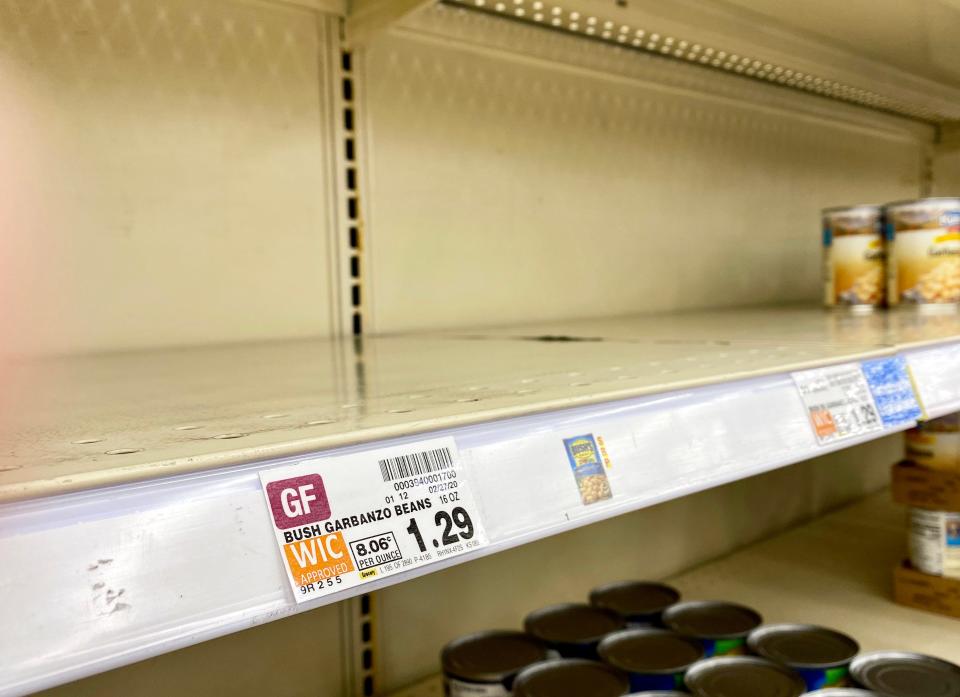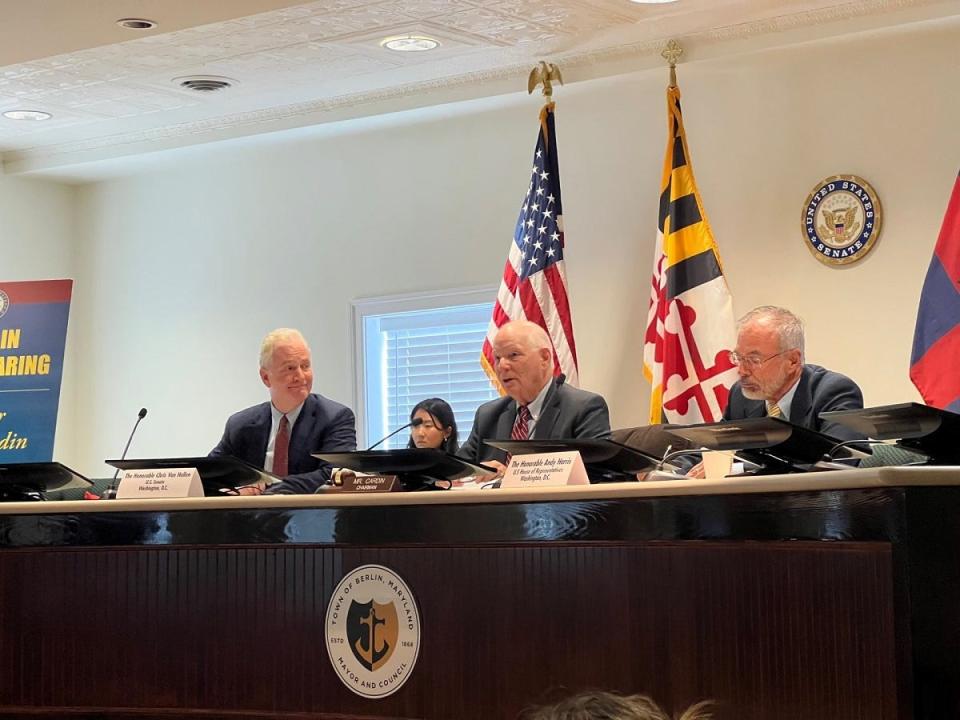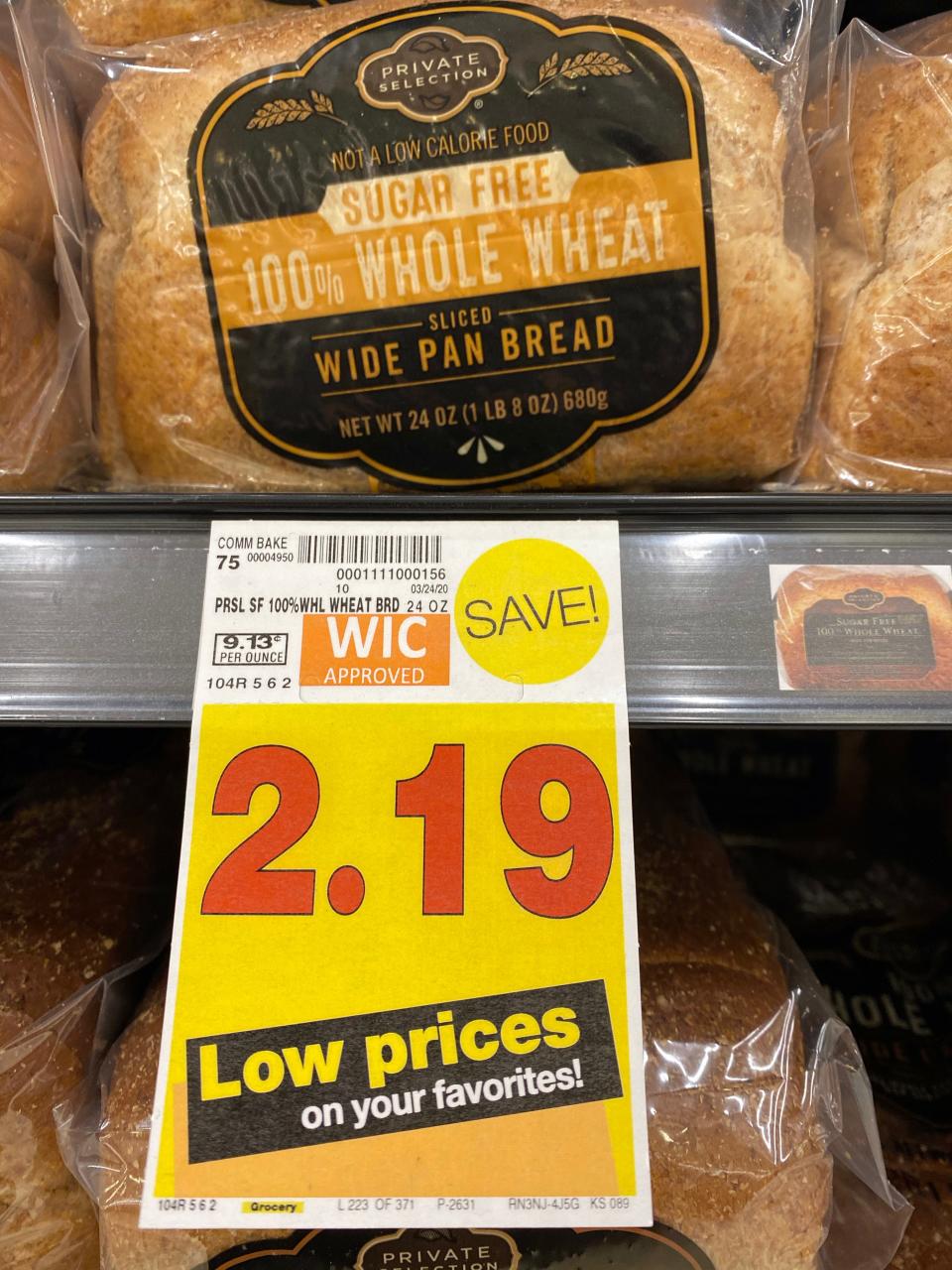Millions of dollars for federal food program are in balance. Rep. Andy Harris weighs in.
- Oops!Something went wrong.Please try again later.
In Maryland over the last year, about 122,000 mothers, babies, and young children received additional nutritious food because of the U.S. Department of Agriculture’s WIC (Women, Infants, and Children) Program.
Two of those who benefitted are in the household of Briana Howell, an Early Head Start teacher in Wicomico County on Maryland’s Eastern Shore.
“It could be a meal,” said Howell, mentioning the cheeses, cereals and gallons of milk she gets for her 1-year-old because of WIC. Without it, she says, “I probably would not be able to keep up on the milk supply.”

More: Would you eat blue catfish? Try this recipe to help the Chesapeake Bay
Howell’s U.S. representative, Republican Congressman Andy Harris, chairs the appropriations committee that deals with the program’s budget, not just for Wicomico County and Maryland, but for the entire country.
There are two agriculture bills in Washington---the WIC-stagnant, Harris-backed House bill and the Democratic-led Senate bill that adds a few hundred million dollars to the program. The democratic process now underway could determine whether the program gets the funding that the longtime leader of the department says it needs.
According to the USDA website, the program served about 6.3 million participants each month in fiscal year 2022 at a total federal cost of $5.7 billion. The size of the WIC program, which began in the 1970s and was initially modeled after a food voucher program that started in a Maryland neighborhood, has ebbed and flowed in recent decades.
A study, backed by the department, showed that an average of 12.13 million moms, babies and young children were eligible for WIC in 2021, but only about half (6.21 million) of those who were eligible actually participated.
WIC has nearly 3 million fewer participants today in 2023 than it did at its peak in 2010.
Harris, whose committee funds WIC, says he supports nutrition programs
In a statement, Harris voiced his support for nutrition programs while not backing an adjustment in WIC appropriations.
“I strongly support nutrition programs and as the Chairman of the House Agriculture Appropriations Subcommittee am focused on working with the appropriate authorizing Committees in Congress on figuring out why WIC participation levels are rising and how to put it on a more sustainable path,” he said.
2022, Democratic President Joe Biden’s full first year in office, was the first year since 2010 that the WIC program showed any growth in participants, increasing by about 16,000 participants and nearly $700 million in federal costs.
This increase marked a return to the spending levels in 2017 when Republican President Donald Trump first took office, but participation levels for the program have not yet rebounded — still about a million fewer participants than when Trump started his term.

In the statement, Harris said the department “recently transferred $500 million into WIC, and it has a $150 million contingency the Secretary of Agriculture can access.”
He said there was “no cut” in WIC funding in his committee’s 2024 bill. “It was funded at the same $6 billion level as last year,” said the seven-term rep, who became chair earlier this year.
More: Maryland's Andy Harris explains House speaker saga role: 'Congress is going to work better'
‘You fund your priorities,’ says U.S. Secretary of Agriculture Tom Vilsack
For U.S. Secretary of Agriculture Tom Vilsack, whose department administers the program, that proposal “creates a circumstance and situation where we would be faced with waiting lists and people being denied benefits or reduced benefits.”
“In the strongest, greatest nation on earth, we ought to have the resources to take care of our children,” said Vilsack, a Democrat and former governor of Iowa, who has led the department during parts of three different decades, in a phone interview. “You fund your priorities.”
He pointed to the national defense budget (last year $816.7 billion) and indicated WIC participants experience fewer infant deaths, fewer premature births, and higher cognitive development among children.

“The WIC program is a program that basically pays for itself in terms of the overall benefits that accrue,” said Vilsack, U.S. Agriculture Secretary in both the Biden and Obama administrations. “Even in recessionary times, we have always found a way to fund, adequately and fully, the WIC program, in a bipartisan way.”
The bill, which passed out of Harris’ committee in June, failed to gain the support of the full House during a vote at the end of September. The Senate’s legislation, which passed through committee unanimously in June, shows a 2024 Senate committee recommendation of $6.3 billion, $300 million more than the current proposal that the Harris-chaired committee passed. The agriculture bill is one of a handful of the 12 bills that the House still has to pass to fund the government.
On Nov. 1, the Senate’s agriculture bill passed. With the House bill still not passed, final federal funding for the program in fiscal year 2024 is yet to be determined.
U.S. Senator Chris Van Hollen, D-Md., who serves on the Senate's Committee on Appropriations, voted to approve the $6.3 billion in WIC funding last week. The legislation passed the full Senate with an 82-15 vote.
"I will keep fighting to fully fund WIC so we can meet the needs of children and families across Maryland and the country,” said Van Hollen, in a statement.
Maryland mother calls program ‘very, very helpful.’
Meanwhile, in Maryland, thousands across the state that the legislators represent are banking on the program.
In Western Maryland’s Washington County, 3,185 individuals participated in the WIC program each month during the state’s last fiscal year, Jackelyn Hirsch, WIC Program Coordinator in the Washington County Health Department, said in an email.
In the middle Eastern Shore, where Harris resides, a total of 2,643 women, infants and children participated in the WIC program in the counties of Dorchester, Caroline and Talbot each month during the state’s last fiscal year, said Mid-Shore WIC Program Administrator Joyneka Moals.
David McCallister, a spokesperson Maryland Department of Health, said in an email that the program increases “the variety of healthy foods in a household and helps to bolster nutrition security.”

For the teacher in Wicomico County, Howell, she called the program “very, very helpful to my family.” Asked last week if she had any message for the man in Washington who helps run the program, the mother said: “Please keep the program going.”
Dwight A. Weingarten is an investigative reporter, covering the Maryland State House and state issues. He can be reached at dweingarten@gannett.com or on Twitter at @DwightWeingart2.
This article originally appeared on Salisbury Daily Times: Rep. Andy Harris weighs in on millions of dollars for WIC food program

